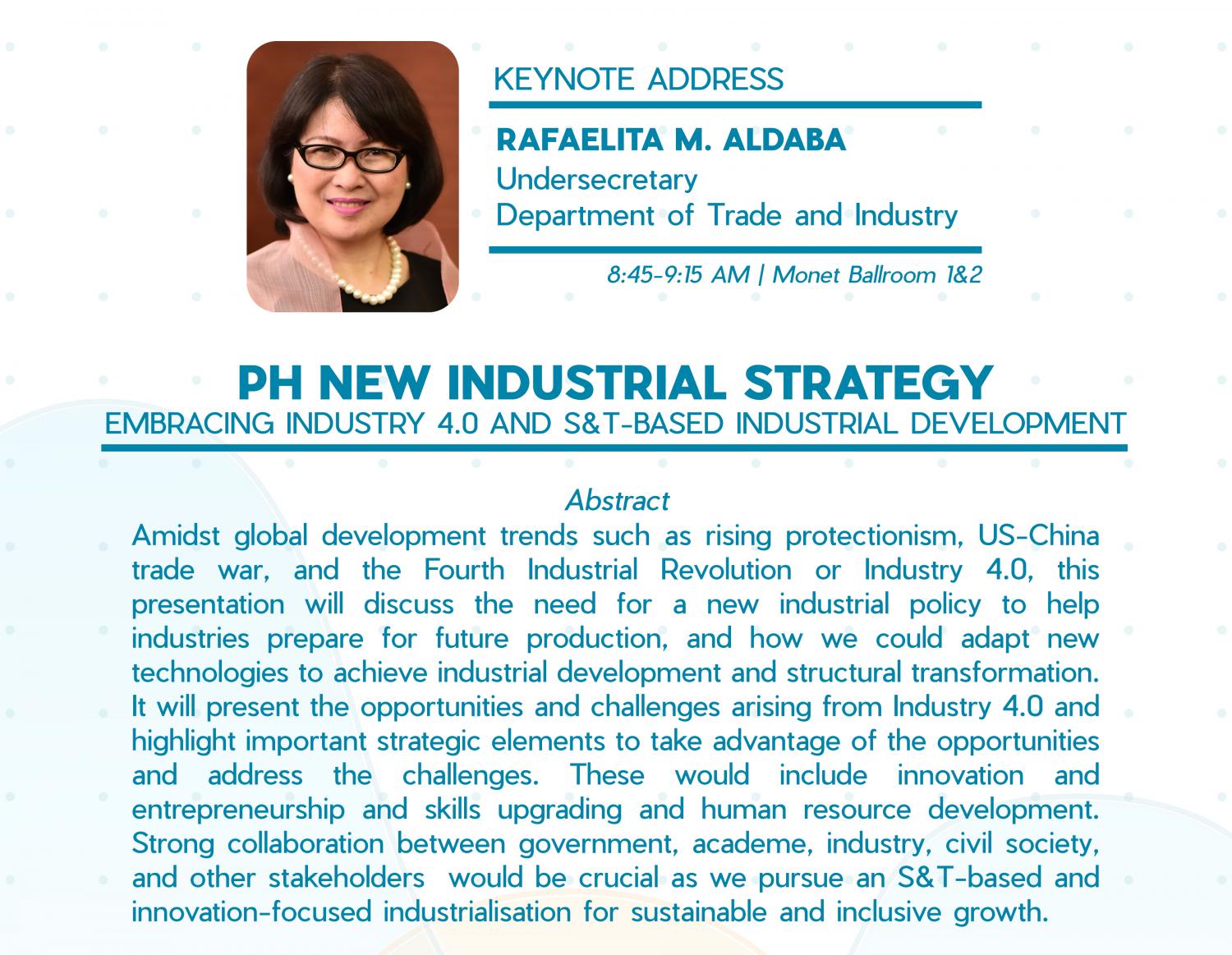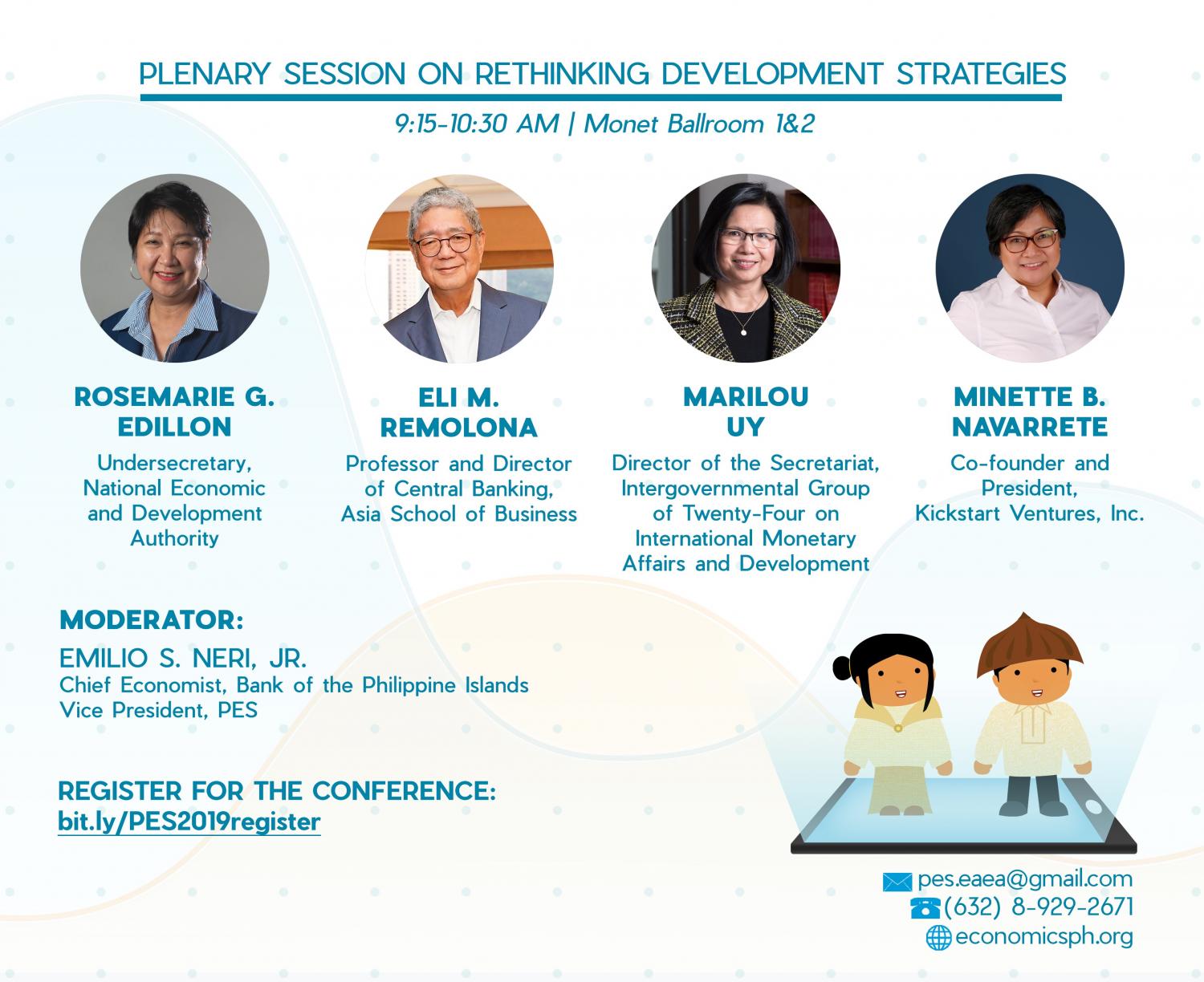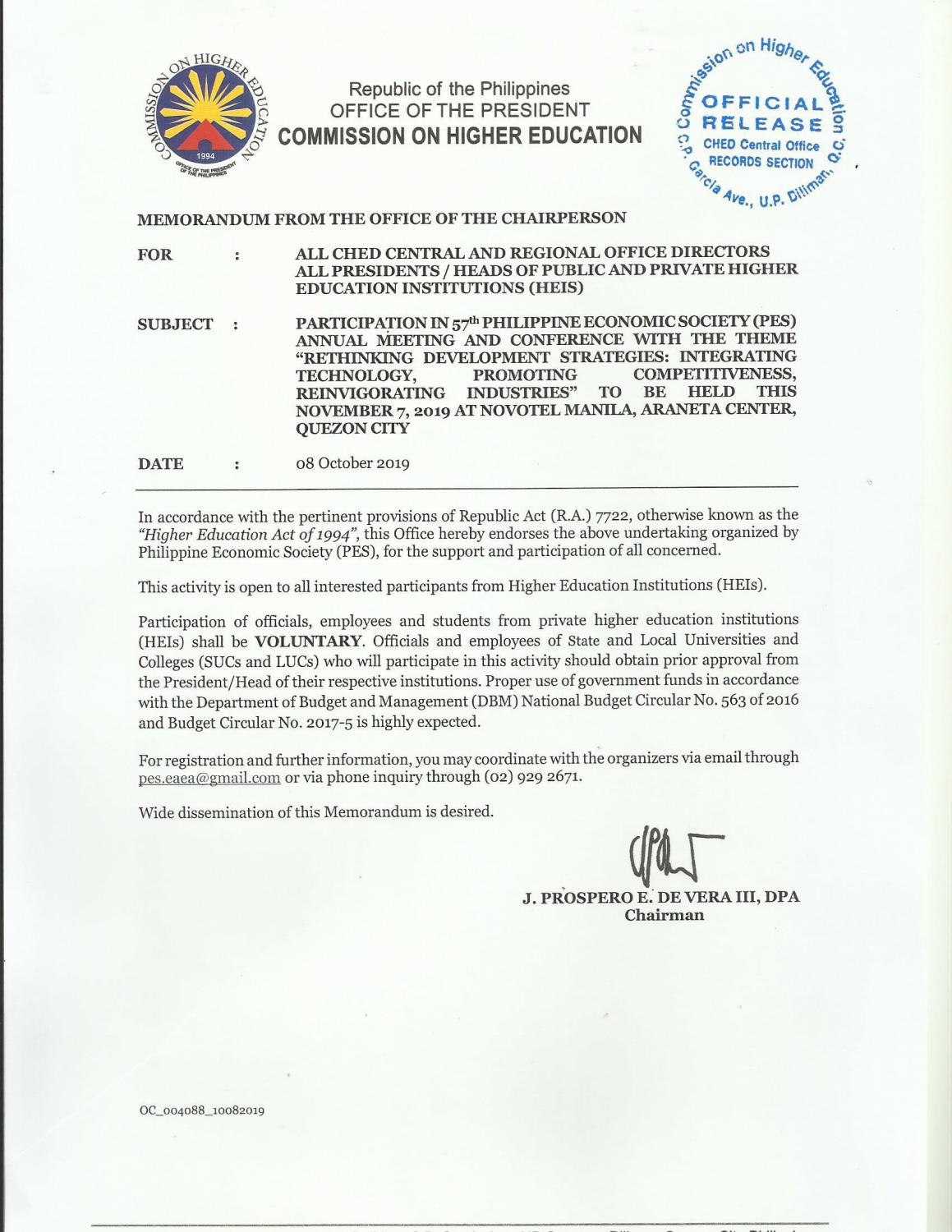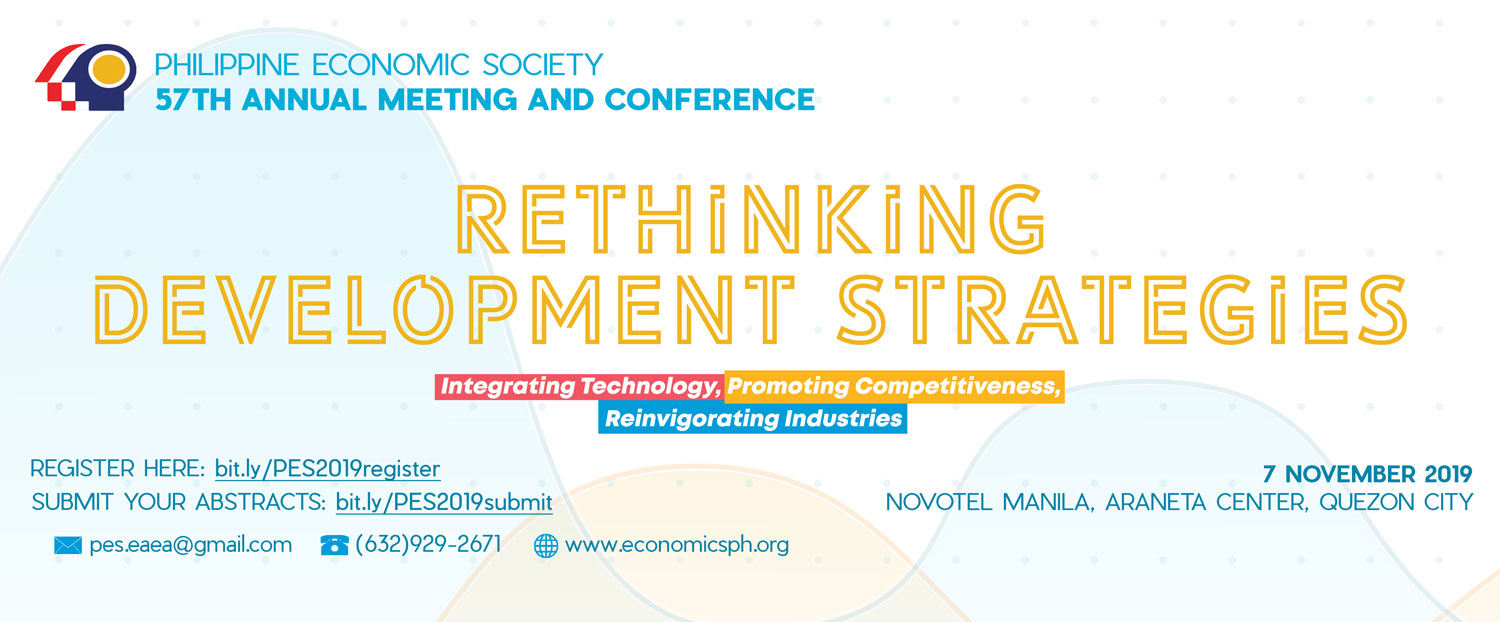Rethinking Development Strategies: Integrating Technology, Promoting Competitiveness, Reinvigorating Industries
07 November 2019 | Novotel Manila, Araneta Center, Quezon City
The Philippine economy has been growing at an average of more than six percent since 2010. The country’s economic vitality anchors in strong consumer demand, supported by remittances and improving labor market amid increasing urbanization and a growing middle class. Economic growth is further buoyed in recent years by capital investments as businesses improve productive capacity and the government pursues its infrastructure investment programs. Maintaining and strengthening this growth trajectory, however, may require rethinking of development strategies specially in the context of emerging technological trends. These technological advancements pose new opportunities and challenges to the Philippines, appearing in many facets of the economy, businesses and people’s lives such as in the rise of e-commerce, financial technology, sharing platforms, IT-BPM industry, and Industry 4.0.
Technology can promote competitiveness and productivity growth. It can benefit the agriculture sector through mechanization and the application of biotechnology, and the manufacturing and services through the integration of production systems, streamlining of processes, and improvements in supply and value chain. It is also seen as part and parcel of the solution to reduce the complexity of doing business in the country; promote social inclusion and participation; and address health and environmental challenges. Nonetheless, technologies can also be a potential source of risks and disruptions in the form of social inequality, labor displacement, and security and privacy risk. Managing the risks associated with disruptive technologies needs thoughtful answers to questions like how to better educate and equip the youth for the future, how to upgrade and reskill the workforce, how to make MSMEs more innovative, and how to address regional disparities and imbalances, among others.
Ultimately, the narrative on technology is tied to its potential as a driver of structural reforms and long-term economic development. To sustain growth, the economy needs to industrialize. Industrialization is not just about manufacturing, but also about the manufacturing sector’s linkages and connections with agriculture and services. In this age of digital and knowledge economy, how can the Philippines industrialize, and what should be the strategy? Our economic sectors are largely characterized by gaps in supply and value chains; by low value, back-end assembly and test; and high dependence on imports due to lack of local raw materials and intermediate parts and components supply. It is also largely dominated by the services sector particularly by the wholesale and retail including low value-added repair of vehicles and appliances. Given its current economic structure, how can the country leverage technologies to realize inclusive and sustainable growth and development goals?
For more information, you may contact us at pes.eaea@gmail.com or (02) 8-929-2671.
Program and Speakers
| Attachment | Size |
|---|---|
| Program - 57th PES Annual Meeting and Conference | 359.91 KB |
Conference Program
| 7:30-8:30 AM |
Registration |
| 8:30-8:45 AM |
Welcome RemarksLawrence B. DacuycuyPresident, Philippine Economic Society
|
| 8:45-9:15 AM |
Keynote PresentationPH New Industrial Strategy: Embracing Industry 4.0 and S&T-based Industrial DevelopmentRafaelita M. AldabaUndersecretary, Department of Trade and Industry
|
| 9:15-10:30 AM |
PLENARY SESSION I. Rethinking Development StrategiesPanel Speakers:Rosemarie G. EdillonUndersecretary, National Economic and Development Authority
Eli M. RemolonaProfessor of Finance and Director of Central Banking, Asia School of Business
Marilou UyDirector, Intergovernmental Group of Twenty-Four on International Monetary Affairs and Development
Minette B. NavarreteCo-founder and President, Kickstart Ventures, Inc.
Moderator:Emilio S. Neri, Jr.Chief Economist, Bank of the Philippine Islands
|
| 10:30-11:30 AM |
PLENARY SESSION II. Climate Change and the Economy: Translating the Physical Impacts of Climate Change into Economic Terms(Sponsored by the National Economic and Development Authority)Presentation on Estimation of Climate Change Damage FunctionsWorld Bank
Panel of Reactors:Rosemarie G. EdillonUndersecretary, National Economic and Development Authority
Emmanuel de GuzmanSecretary, Climate Change Commission
Laura DavidDirector, Marine Science Institute, University of the Philippines
Agustin ArcenasAssociate Professor, School of Economics, University of the Philippines
Moderator:Nerissa EsguerraDirector, Development Information Staff, National Economic and Development Authority
|
| 11:30-12:30 PM |
PLENARY SESSION III. The Fourth Industrial Revolution and ASEAN Economic Integration: Issues in Research and Methodologies(Sponsored by the De La Salle University)Structure of Research in the Philippines: Implications on the Fourth Industrial RevolutionTereso S. Tullao, Jr.Adjunct Professor of Economics, De La Salle University
Engineering the Circular EconomyRaymond R. TanVice Chancellor for Research and Innovation, De La Salle University
Moderator: Mitzie Irene P. ConchadaAssociate Dean and Full Professor, School of Economics, De La Salle University
|
| 12:30-1:30 PM |
LunchInduction of New PES MembersAwarding of Best PapersBreakout Session: Strategies in Publishing: Conversations with Journal Editors(Slots are limited. Click here to register.)Panel Speakers:Calla WiemerEditor-in-Chief, Journal of Asian Economics
Jesus FelipeManaging Editor, Asian Development ReviewTereso S. Tullao, Jr.Editor-in-Chief, DLSU Business and Economics Review
Emmanuel S. de DiosImmediate former Editor-in-Chief, The Philippine Review of Economics
Moderator:Majah-Leah V. RavagoAssociate Professor, Ateneo de Manila University Department of Economics
|
| 1:30-3:00 PM |
Parallel Sessions ASession A1. Innovative Approaches in Measuring Poverty and Poverty Impact Assessment (DLSU-sponsored session)Session A2. Labor Market Characteristics of the Disadvantaged Sectors (NEDA-sponsored session)Session A3. Trade, Capital Flows, and Macroeconomic Fluctuation (BPI-sponsored session)Session A4. Socioeconomic Researches in Agriculture, Aquatic, and Natural Resources (AANR) Sector (PCAARRD-sponsored session)Session A5. Economics of the Household: Theoretical and Empirical PerspectivesSession A6. Issues and Possibilities in the Economics of InnovationSession A7. Institutional Economics, Law and Order, Liability RulesSession A8. Human Capital, Education, and Social Mobility
|
| 3:00-3:20 PM |
Break and Poster Session |
| 3:20-4:50 PM |
Parallel Sessions BSession B1. The Fourth Industrial Revolution in Finance and Insurance: Issues and Challenges (DLSU-sponsored session)Session B2. Local Econ-spatial Planning (NEDA-sponsored session)Session B3. Digital Economies, Productivity, and Efficiencies (FNF-sponsored session)Session B4. Bangko Sentral ng Pilipinas Session (BSP-sponsored session)Session B5. Assessing Human Capital Outcomes in the PhilippinesSession B6. Technological Change and the Philippine Labor MarketSession B7. FisheriesSession B8. Agriculture
|
| 4:50-6:00 PM |
PLENARY SESSION IV. Dynamic Markets, Growth, and Inequality: Can Antitrust Crack the Code?(Sponsored by the Philippine Competition Commission)Panel Speakers:Arsenio M. BalisacanChairman, Philippine Competition Commission
Stella Luz A. QuimboMember, House of Representatives
Kelly BirdCountry Director (Philippines), Asian Development Bank
Raul V. FabellaProfessor Emeritus, University of the Philippines School of Economics
Guillermo M. LuzChairman, Liveable Cities Challenge
Moderator:Ronald U. MendozaDean, Ateneo School of Government
Induction of Young Economists Honor Society 2019Announcement of PES Election ResultsClosing Ceremony |
Conference Registration
How to Register
Step 1. Fill out the online registration form.
Step 2. Pay the corresponding registration fees:
| Regular rate | PhP 3,000 |
| Early bird rate | PhP 2,400 (only until 30 September 2019) |
| PES Members | PhP 1,500 |
| Paper Presenters | PhP 1,500 |
| Students | PhP 1,000 |
Payment options:
Pay online:
Pay through bank deposit and send a clear copy of the deposit slip to pes.eaea@gmail.com:
Account name: Philippine Economic Society, Inc.
Account number: SA 408 009 8378
Bank branch: BDO West Avenue-Del Monte Branch
-->
Plenary Speakers


Presentations
Disclaimer: This listing includes only the presentations whose authors gave us permission to make available to the public.
(Click on the titles to access a PDF copy of the presentation files.)
Keynote Presentation
PH New Industrial Policy i3S: Embracing Innovation and Industry 4.0 (Undersecretary Rafaelita M. Aldaba, Department of Trade and Industry)
Plenary Presentation
Estimating Climate Change Impacts in the Philippines (Stephen Ling, World Bank-East Asia and Pacific Region)
Breakout Session: Labor Market Characteristics of the Disadvantaged Sectors
Out-migration in Philippine Agriculture (Ritchelle J. Alburo, National Economic and Development Authority)
Determinants of Female Labor Force Participation (Rosemarie G. Edillon, National Economic and Development Authority)
Breakout Session: Socioeconomic Researches in Agriculture, Aquatic, and Natural Resources (AANR) Sector
Role of Cooperatives in Technology Adoption for Improved Production and Market Efficiency in Dairy Buffalo (Agham Cuevas, University of the Philippines-Los Baños)
Breakout Session: Local Econ-spatial Planning
Economic Impact of Pedestrianization of an Urban Space in Metro Cebu (Crispin Diaz, UP Planades)
Estimating the Urban Carrying Capacity of Baguio City (Donna Tabangin, CERTEZA)
Breakout Session: Agriculture
The State of Selected Agri-tourism Venture in Bohol (Rosemary G. Zacal, Holy Name University)
Call for Papers and Sessions
CHED Endorsement

| Attachment | Size |
|---|---|
| CHED endorsement memorandum | 374.24 KB |
 Philippine Economic Society (PES)
Philippine Economic Society (PES)